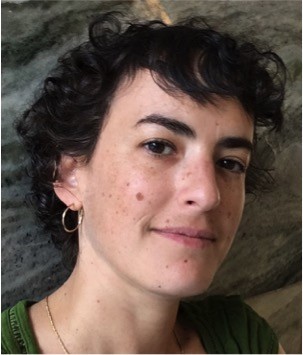Gender & Diversity Coffee Hour
The Gender & Diversity Coffee Hour is an informal monthly gathering, typically on a Friday morning, to discuss matters pertaining to gender and diversity in STEM fields. These coffee hour sessions are open to ALL members of the Lamont community, and participation by males is strongly encouraged. If you have an idea or suggestion for a topic of discussion at the coffee hour, please let us know.

Facilitated by graduate student Maayan Yehudai, topics of discussion at these coffee hours have included: women in science; harassment in the field; underrepresented minorities in science; LGBTQ awareness in STEM; implicit bias; networking; mentoring; impostor syndrome; and others. Current research and literature on these topics is often discussed at these gatherings, as well as issues concerning the Lamont and larger geoscience communities.
Some of the discussions are summarized below:
Transgender Awareness: The Incomplete Guide to Trans and Non Binary Identities: This session featured guest speaker Anthony Arrien, a transgender man who has facilitated the adult transgender peer support group for The LOFT: LGBT Community Services Center for several years. Tony came out publicly as trans on local community television in April of 2017. He an artist and a filmmaker who operates an educational channel in Putnam Valley, NY, and does advocacy for Local Community TV as Chairman of the Alliance for Community Media of New York. His presentation delved into the separate spectra of Gender Identity, Gender Expression, Sexual Orientation and Physical Sex to lay the groundwork for eliminating the confusion frequently encountered by mere observation. The presentation covered terminology, the presence of dysphoria in both binary and non binary identities, and the pitfalls of trans etiquette mistakes and the failure to correct them. He also explored the psychological and various societal stresses of being trans, and the types of mental, social and physical transition that people experience while grappling with their growing awareness of being transgender. (Nov 2019)
Mental Health Stigma in Academia: Led by Dr. Jennifer Middleton and Bridgit Boulahanis, this session focused on the prevalence and associated stigma of mental health issues in academia. Recent findings published in Research Policy suggest that 32% of Ph.D. students are at risk of struggling with mental health disorders. Important mental health risk factors identified within the academic lifestyle include: conflicting work and family commitments, supervisor’s leadership style, job demands and job control. The discussion centered around the Science Magazine article, “Ph.D. students face significant mental health challenges” that summarizes the above study, as well as results of an anonymous poll of the Lamont community that aimed to assess participants’ experience of mental health and stigma. Larger discussion points touched on the ways in which the academic lifestyle may lead to increased rates of depression and anxiety, how these risk factors may differentially impact underrepresented minorities, and what the Lamont community can do to improve its culture surrounding the discussion and maintenance of mental health. A compiled list of mental health resources available to the Columbia community can be found here. (Sep 2019)
Retention of Women in STEM at All Career Stages: Led by Dr. Indrani Das and Dr. Laura Stevens, this session explored the topic of retaining women in STEM fields across all career stages. Some of the readings for the session included gender imbalance in the geosciences, and the importance of role modeling as a viable retention strategy. The discussion centered around whether the problem is one of a leaky pipeline or the lack of a viable working structure. While the problem remains the same, the solutions are possibly different, depending on the framing of the issue. If viewed as a leaky pipeline, it suggests that more women need to be hired in order to increase the number who advance through the ranks. If viewed as a structural problem, it suggests that one needs to look into fundamental and structural issues that cause women to leave STEM. (April 2019)
Parenting in Academia: This session, co-led by Dr. Jonathan Nichols and Dr. Allegra LeGrande, explored the challenges of parenting in academia in the context of the disproportionately larger burden that women bear. A recent study found that almost half of all US female scientists leave full-time science after having their first child. In this conversational style session, attendees shared their experiences with parenthood in academia and covered a wide range of scenarios. These included becoming parents during graduate school, or postdoctoral years, or later in life. The discussion also included support structures such as personal ones (spouse, extended family) or institutional support (paid/unpaid parental leave). (March 2019)
Long-Distance Couples in Academia: The Balancing Act: This session, co-led by Dr. Jennifer Middleton, Carolien Mossel, and Lucy Tweed, examined the two body problem in academia. While some institutions offer jobs to the partners of the people they want to hire, this is not very prevalent (only around 12% of the time as per this 2015 Scientific American survey) and there is a growing "two-body" problem in academia, with the result being that quite often, academic couples are scattered in location. The timing of these transitions often occur during periods of family formation, and junior scientists and faculty, especially women, tend to be most impacted. In addition, the human dimension - be it having to choose between academia and family or dealing with loneliness and not having an emotional support system nearby - can take its toll. All these can lead to a loss of talent and diversity, i.e. these contribute to the leak in the academic STEM pipeline. This session covered the following articles: Degrees of Separation and Academic Scattering. Additional reading: Dual career couples in science (February 15, 2019)
Progress on Harassment Policies: Where Do We Stand? Co-led by Dr. Sophie Hines this session examined a specific incident at the American Geophysical Union (AGU) Fall Meeting in December 2018, where a poster presenter publicly discredited victims of sexual harassment, and made a broader statement that paying attention to harassment allegations compromises the core mission of science. This led to a discussion of AGU's own policies and an examination of how such a poster was allowed in the first place. AGU issued an official response, as did the Geological Society of America (GSA) where the poster presenter was employed at the time of the incident. This session included a broader discussion of how much progress we have really made with respect to preventing harassment in the workplace and/or protecting victims who come forward. (January 25, 2019)
Visibility and Representation of Women and Minorities: Guest speakers Dr. Róisín Commane (DEES Asst. Professor) and Erinn Springer (photographer and documentarian whose work has been featured in the New York Times and other venues) shared images and experiences from Erinn’s latest project "Particle for Scale," focused on shadowing female scientists in remote locations to create a visual narrative and intimate journal around the daily life and discoveries made in the field. Particle for Scale was completed with the women of NASA’s Atmospheric Tomography Mission (AToM), a collaborative mission led by Harvard University to examine how human-produced air pollution affects greenhouse gasses and other chemically reactive gasses in the atmosphere. For this project, Erinn documented the flying laboratory, led by Roisin Commane. (Nov 30, 2018)
Definitions of Masculinity and How They Impact Us All: Led by Dr. Jonathan Nichols (Lamont Associate Research Professor), this discussion focused on the definitions of masculinity and how they impact us all. This discussion was based on a piece in the Atlantic, "Today's Masculinity is Stifling" and centered around notions of what it means to be a boy or a girl. In addition the following were discussed: A video on Girl Toys Vs. Boy Toys: The Experiment, the United States of Anxiety podcast episode about power imbalance and men's identity evolution in the 20th century, and an article about Deep Space Nine and Black Fatherhood. (Oct 29, 2018)
Dual Career Couples: Can Women Really Have it All? Led by Maayan Yehudai, this discussion focused on the challenges of dual career couples and the choices women often face when juggling marriage, children, and careers. This discussion focused on an article in Eos on the difficult personal decisions faced by people when dealing with dual career issues. There was a larger discussion on work-life balance issues in general, including long-distance relationships, uprooting oneself from familiar places and people in order to pursue a career or further a spouse's career, and not always having the ability to devote adequate time to the needs of one's children and other family members. (Sep 28, 2018)
Does your Institution Foster a Culture of Sexual Harassment? Led by Maayan Yehudai, this discussion focused on the recently released report by the National Academies of Science, Engineering, and Medicine (NASEM) on Sexual Harassment of Women: Climate, Culture, and Consequences in Academic Sciences, Engineering, and Medicine and its discussion as published in Eos. This discussion focused heavily on the Recommendations section of the NASEM report, going over each recommendation and discussing its applicability to Lamont and the larger geoscience community. (June 15, 2018)
Fighting Impostor Syndrome: Your Name is on the Door for a Reason: Organized and led by Elise McKenna Myers, this session included a presentation by guest speaker Dr. Jacquelyn Gill on the topic of Impostor Syndrome. The discussion centered around an article by Dr. Gill on the subject, and on the importance of raising awareness on this syndrome along with the acknowledgement that different people experience it differently. Further, marginalized groups are especially vulnerable to this as they often have to work harder to prove themselves in a white male dominated environment. For further reading, check out this article in the Chronicle. (May 4, 2018)
Gender Bias in the Geosciences: This discussion, led by Maayan Yehudai as part of the Lamont Harassment Awareness Month 2018, focused on gender bias in the geosciences. In addition to implicit bias, other more overt biases and challenges were also discussed. This session discussed the following articles: Data Illuminate a Mountain of Molehills Facing Women Scientists; Double Jeopardy in Astronomy and Planetary Science (focusing on women of color), and Columbia's own commitment to promoting diversity. Discussion points included the importance of raising awareness on bias within the Lamont and larger STEM communities, including self-awareness of one's own implicit biases. (March 5, 2018)
Are Women and Minorities Penalized for Promoting Diversity? Led by Maayan Yehudai, this session examined this article in Harvard Business Review on whether women and minorities are penalized for promoting diversity. Discussion on the topic included having participants ask themselves questions such as: i) How did you feel about this paper? ii) Do you feel like this really exists in academia? At Lamont? iii) Are we privileged? Am I privileged? What does that even mean? iv) What are the structures that exist that may be maintaining this situation? v) What sort of leadership is needed to prevent these kinds of problems? vi) What can be done at an institutional level? vii) What can be done at a personal level? (Feb 16, 2018)
Harassment in the Geosciences: Guest speaker Prof. Robin Bell (AGU President-Elect and Lamont Research Professor) gave a presentation on harassment in the geosciences, and the ways in which institutions can respond. This session included discussion on AGU Ethics Policy that defines harassment as a form of scientific misconduct, and Prof. Bell's opinion piece in Science on harassment. This session focused on the importance of raising awareness on harassment, as people often do not believe it to be real unless they are personally faced with it. Further, the Clancy 2014 study was discussed that showed that an overwhelming majority of women were harassed in the field, and that women were more likely to be harassed by their superiors while men were more likely to be harassed by their peers. (Dec 8, 2017)

